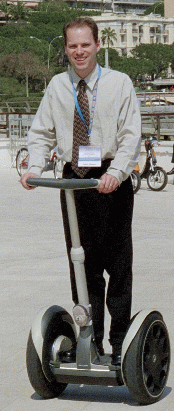 | This is the professional dossier of Dr. Gregory L. Plett. Dr. Plett received the B.Eng. degree in computer systems-engineering with high distinction from Carleton University, (Ottawa, Canada) in 1990, and the M.S.E.E. and Ph.D. degrees in Electrical Engineering from Stanford University (Stanford, CA) in 1992 and 1998. He joined the faculty of the University of Colorado at Colorado Springs (UCCS) in the Fall semester of 1998, and is now Professor of Electrical and Computer Engineering. Dr. Plett has taught courses at Stanford University, Universidad Nacional Autónoma de México, and UCCS; has published papers in IEEE, Electrochemical Society, Elsevier, and Wiley journals and a number of conferences; has successfully competed for internal UCCS grants and nationally with the NSF, and is joint holder of several United States patents. He is a Senior Member of the IEEE. Dr. Plett's research is now largely done in collaboration with Prof. Trimboli at UCCS. They are focused on research in control systems as applied to the management and control of high-capacity battery systems, such as found in hybrid and electric vehicles. Current research efforts include: physics-based reduced-order modeling of ideal lithium-ion dynamics; system identification of physics-based model parameters using only current-voltage input-output data; physics-based reduced-order modeling of degradation mechanisms in electrochemical cells; estimation of cell internal state and degradation state; state-of-charge, state-of-health and state-of-life estimation; power and energy prediction using model predictive control and other advanced techniques to extend life; battery pack fast charging. Research is both theoretical and empirical: the UCCS high-capacity battery research and test laboratory houses equipment to test cells, modules, and battery packs, and is home to our own custom battery-management system and our own battery pack simulator projects, which enable cutting-edge research in advanced but practical algorithm prototyping. Courses and programs in control systems and specializing in battery controls support this research effort by educating qualified researchers. |